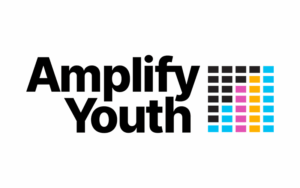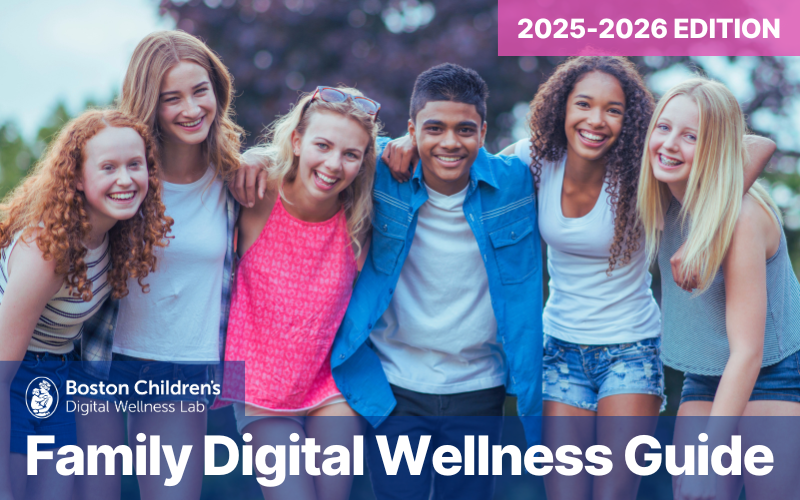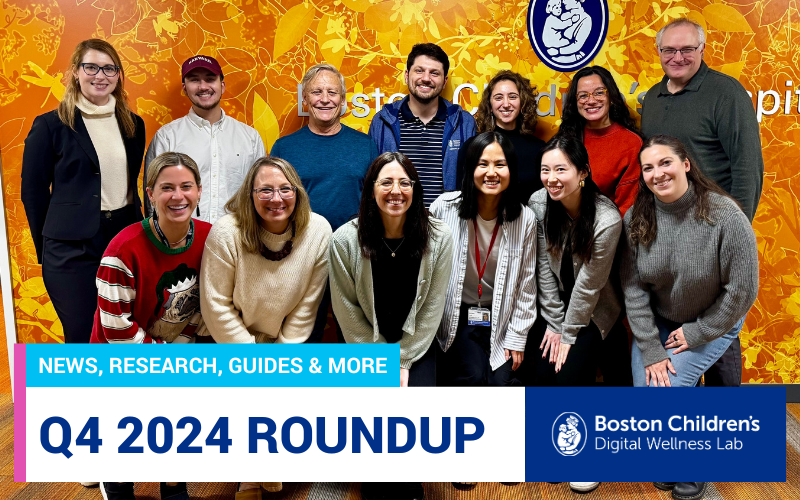This past quarter, we continued our mission to create a healthier, safer internet by joining leaders and innovators around the world to discuss online safety, digital wellness, and youth empowerment. Q4 highlights include new research on teens’ views of AI, the first #InspiredInternet Pledge annual review, and participation in global forums on digital wellbeing and adolescent health.
The Lab’s Q4 Highlights
- Released our newest research: Pulse Survey: Optimism and Uncertainty — How Teens View and Use Artificial Intelligence, exploring how teens are navigating the many opportunities and challenges that come with using AI tools including Voice Assistants (VAs) and Generative AI (GenAI). The report discusses gaps in teens’ access to, and knowledge of, AI tools, and highlights potential future directions for generating guidelines and policies that will enable adolescents to fully and ethically engage with these tools.
- Held the first annual review convening for the #InspiredInternet Pledge! Over 45 Pledge Signatories and Advisors from across the globe convened virtually to discuss successes, challenges, and lessons learned from the first year of the Pledge and to plan for an even greater impact and reach in 2025.
- Welcomed 17 exceptional high school students from around the U.S. to serve on our 2024-25 Student Advisory Council. Throughout the school year, we’ll be discussing pressing topics of digital wellness, including school cell phone policies, the role of digital spaces in fostering community, and social media’s effects on mental health, digital literacy, and civility online.
- Joined global leaders and innovators to discuss the future of online safety, digital wellness, and youth empowerment at the Family Online Safety Institute’s Annual Conference in Washington, DC. The Lab’s Executive Director, Cori Stott moderated the panel “Online to Offline: Empowering Users to Safely Navigate Digital Spaces,” with leaders from Uber, Snap, Foundation for Social Connection, and the National Network to End Domestic Violence. The Lab’s Research Director, Dr. David Bickham spoke on the panel “Parenting in an AI World,” exploring the opportunities and challenges of AI, alongside experts from Amazon and Ash Brandin, @TheGamerEducator.
- Shared the first findings from our new study on an innovative PIMU screener at the Annual Meeting of the American Public Health Association. Our screener provides a balanced approach to understanding how media use impacts adolescent wellbeing, equipping health professionals with a powerful new tool to address this escalating adolescent health concern in a supportive way.
- Attended the Dying to Be Beautiful Symposium in Kingston, Jamaica to tackle the intersections of body image, eating behaviors, and overall health. The Lab’s Director and Founder, Dr. Michael Rich led a plenary session titled, “The Good, the Bad, and the Cringey: Interactive Media and the Teen Years.” Lab Consulting Psychologist, Dr. Keneisha Sinclair-McBride presented a talk titled “Black Girl Magic and Digital Wellness in the Influencer Age.” We’re proud to have our team contributing to this vital dialogue and advancing the conversation on adolescent health and digital wellness.
- Participated in an evening of learning and dialogue centered on adolescent brain development. The event included a screening of The Teen Brain (a 10-minute short film directed by Emmy-nominated filmmaker Tiffany Shlain and executive produced by Goldie Hawn and MindUP), followed by a panel discussion featuring Dr. Rich, 2024-2025 Student Advisory Council advisor Blooma, and national experts Ken Ginsburg and Ellen Galinsky. Together, they offered practical advice and insights to help parents, caregivers, and educators better support teens during this pivotal stage.
- Watched with pride as Alicia Owens, our 2024 summer research assistant, took part in a youth panel hosted by Pinterest in Washington D.C., discussing key topics of youth safety and wellbeing online.
- The Lab’s Research Manager Sam Schwamm gave a presentation titled, “Parenting in the Age of Digital Media” to educators and parents at the Milton Academy. His talk included a deep dive into the research on the benefits and risks of interactive media use for youth, along with some evidence-backed guidance for parents and caregivers based on the Lab’s 5 M’s of Digital Wellness.
- Cori Stott and Lab summer research intern Zoë Kronberg joined Healthy Online Platforms for Everyone (HOPE) to address a pressing question: How can we create safe, empowering digital spaces for young people? At the General Coalition meeting youth, prevention leaders, and youth-serving organizations strategized ways to reduce harmful content on social media while promoting healthier behaviors. It was an inspiring event focused on solutions to empower the next generation.
- Launched the Youth & Interactive Media Coalition (YIMC) website for a Digital Wellness Lab-led initiative to facilitate information sharing and research collaboration among groups focused on youth media use across the Harvard University ecosystem.
- Led a continuing education course addressing methods for identification and treatment of Problematic Interactive Media Use (PIMU) with the clinicians from the Clinic for Interactive Media and Internet Disorders (CIMAID). Attendees left equipped with actionable therapeutic strategies for treating PIMU and how to address other media-related physical, psychological, and developmental challenges.
- Congratulations to Dr. Bickham and Dr. Mike Tsappis, co-founder of the Clinic for Interactive Media and Internet Disorders (CIMAID), and Dr. Meredith Gansner, Consulting Psychiatrist for the Lab, for their insightful contributions to the newly released Handbook of Children and Screens.
The Lab in the News
How GPS Tracking of Teens 24/7 Impacts Parent-Child Relationships
Kaitlin Tiches contributed to the conversation on the effects of constant GPS tracking on teen development and family dynamics in Scientific American. In the article, Kaitlin emphasizes that while location apps give parents a sense of security, knowing where teens are doesn’t mean they know what they’re doing. “We equate knowledge of location with safety,” Kaitlin explains, but real safety requires more than tracking — it’s about empowering teens with strategies for handling uncomfortable or threatening situations on their own. The insights shared in this article are a powerful reminder of the need for developmentally optimal supportive approaches that go beyond just “keeping tabs”. Equipping teens to take responsibility for their own safety fosters essential skills that GPS apps can’t replace.
Ten Myths About the Effect of Social Media Use on Well-Being
In an article published in the Journal of Medical Internet Research, Dr. Jeffrey Hall examined ten widespread beliefs about the impact of social media on our wellbeing through an evidence-based lens. Dr. Hall highlights an important concept — Problematic Interactive Media Use (#PIMU) — rooted in clinical research at the Clinic for Interactive Media and Internet Disorders (#CIMAID) and the Digital Wellness Lab. Rather than viewing excessive media use as the root cause of mental health challenges, PIMU emphasizes that such behaviors often serve as coping mechanisms for underlying issues. This nuanced perspective helps guide more effective treatment plans and compassionate care. This article offers valuable insights for clinicians, educators, and anyone interested in fostering healthier relationships with technology.
Why “brain rot” is Oxford’s word of the year
“Brain rot” was named Oxford Languages’ Word of the Year, reflecting growing concerns about how screens impact young minds. In an interview with CBS Boston, the Lab’s Dr. Michael Rich — author of The Mediatrician’s Guide — shared his perspective on the role of adults in guiding kids through today’s digital landscape.
At TwitchCon in San Diego, Online Gamers Share Their Mental Health Journeys
This Times of San Diego article highlighted the conversations around wellness in the online gaming community at TwitchCon San Diego, where gamers opened up about their mental health journeys. The Ruderman Family Foundation presented the Lab’s most recent white paper, “Connected Play: Adolescent Gaming and Perceived Loneliness,” revealing that, while youth of all genders engage in social gaming regularly (93% reported playing video games in the last month), boys turn to gaming more than girls to cope with feelings of loneliness.
With new safety update, Roblox aims to boost protection for young gamers
As more platforms and apps implement enhanced child safety protocols, discussions are growing about what additional steps industry, families, and young people themselves can take to ensure online health and safety. In this NPR feature, the Lab’s founder, Dr. Michael Rich, emphasized the importance of adopting comprehensive, holistic approaches to youth online safety.
From Our Fellow Travelers
- Tech and social media bans alone cannot fix teen mental health featuring YIMC colleague Emily Weinstein
- How Tech Created a ‘Recipe for Loneliness’ New York Times featuring YIMC colleague Dr. Laura Marciano
- APA Recommendations for Healthy Teen Video Viewing featuring input from Dr. Keneisha Sinclair-McBride
- Your Brain on Social Media featuring the 5 M’s of Digital Wellness
- Risks vs. Harms: Youth & Social Media featuring danah boyd
- Is This The Year We Quit Social Media? Apple Podcast from Wired’s UnCanny Valley
- Tech/Life Balance: Helping Families Thrive in a Digital World from the California Partners Project
- Digital Futures for Children new research database from Sonia Livingston at the London School of Economics and Political Science
Resources for Families
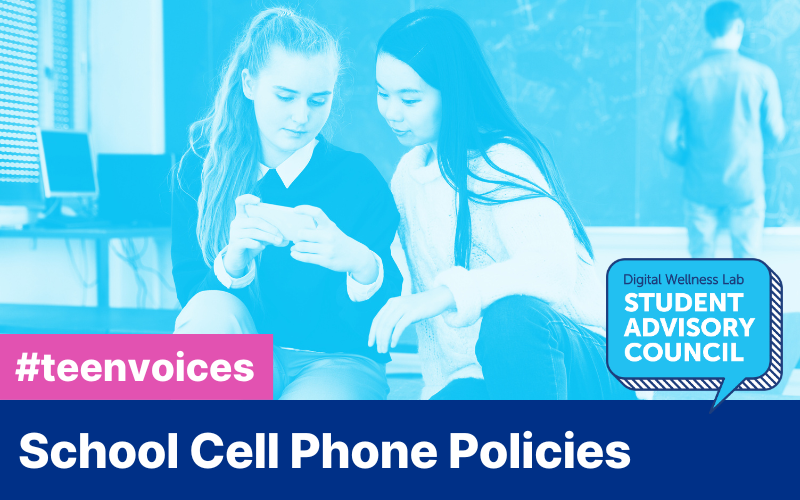
Striking a Balance: Cell Phone Culture in Schools
Our 2024-25 Student Advisory Council kicked off with a thought-provoking discussion on how cell phone policies in their schools impact learning, social connections, and daily life.
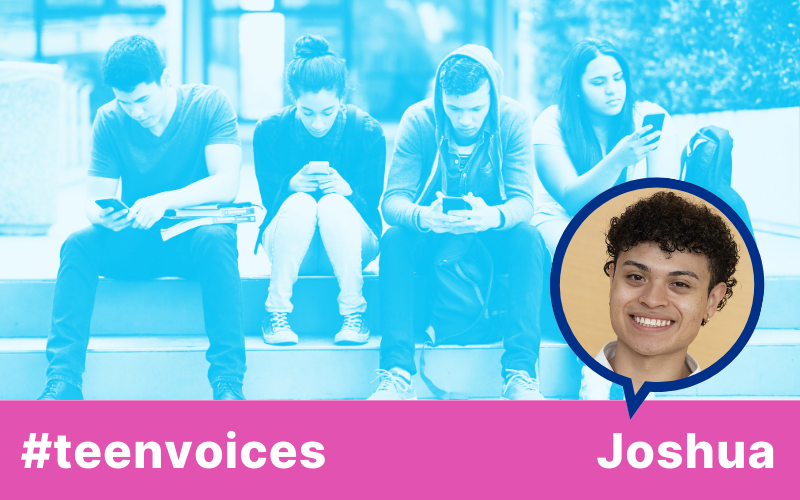
How to Watch Out for Bots, Hackers, and Scams
Josh, a member of the Lab’s 2023-24 Student Advisory Council, offers practical advice for identifying fake accounts to help teens, and the caregivers and adults in their lives stay safe online.
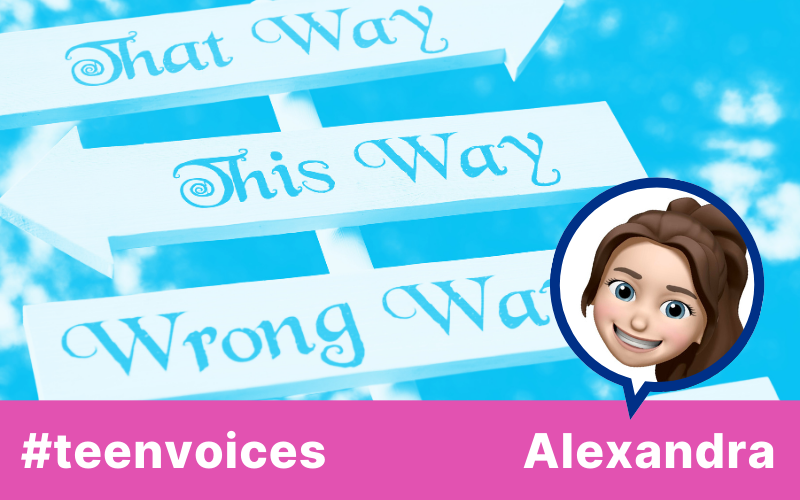
Tips for Teens: Safely Navigating the Complexities of the Online World
Alexandra, a 2024 Summer Teen Advisor at the Digital Wellness Lab, offers insights and advice to help her fellow teens stay safe online.
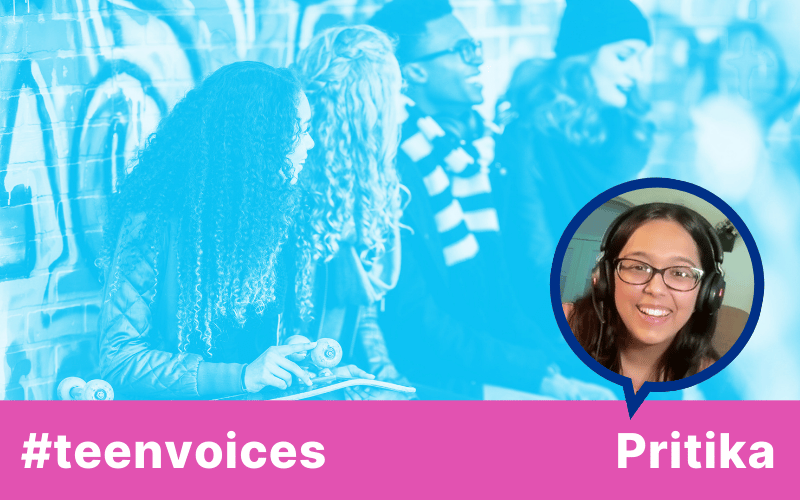
A Youth Perspective on Navigating the Digital World
Pritika shares her thoughts on the complex online landscape, and makes the case that young people need a voice in the discourse, policy and decision-making surrounding the digital world.
Want More?
To catch up on what else we’ve been up to at the Digital Wellness Lab, check out our latest blog posts and press; learn more about our work and how we create impact here; and if you haven’t already, be sure to sign up for our monthly newsletter. Interested in learning more about joining the Inspired Internet Pledge to be a part of the collaborative work to build a healthier internet? Email us at dwl@childrens.harvard.edu to connect!






